Any projection of the trajectory of India’s role in the world in the coming times demands first, an understanding of the current state of the world, and second, an awareness of the factors that are likely to influence its role.
The World Today
The world today is, regrettably, bereft of order and is, in fact, plunged in disorder verging on anarchy and much uncertainty.
The devastating Gaza conflict, the bloody Ukraine war, and China’s aggressive---all of which have grave international ramifications--- underline the fact that the global system established after World War II is giving way to a world without order. The impact of these unsettling developments is being compounded by rapid technological advances and a reshuffling of trade and investment flows accompanied by a disruption of global supply chains. The gravity of the situation would increase exponentially should China, as being speculated, seize the moment to impose reunification on Taiwan, at a time when the US is preoccupied with the Ukraine and Gaza conflicts.
While lasting peace in the Middle East, which appeared to be on the cards till October 2023, has suffered a huge setback on account of the Gaza conflict, our own neighbourhood is unstable and the Indo Pacific is afflicted by serious tensions. China’s footprint---political, military, and economic--- is on the rise the world over including in the Indian Ocean. In this deeply troubled environment, countries are increasingly embracing protectionist economic policies, raising the spectre of economic fragmentation, and the emergence of rival trading blocs. This trend is detrimental not only to economic growth and development but also to peace and stability. The situation is further exacerbated by the growing East-West divide and North-South polarisation.
Even as a US led Western Alliance squares off against a Sino Russian entente many countries are uncomfortable with totally aligning themselves with either and retain linkages with both groupings. Thus, we are now in a multipolar world characterised by issue based partnerships of convenience amongst many countries.
Longstanding rules and norms, like non-intervention in the internal affairs of other countries and the eschewing of expansionism, have increasingly been flouted in recent years, often by those that preach adherence to them most loudly. This has been accompanied by the frequent imposition of unilateral sanctions and weaponisation of supplies which have wrought massive economic damage and supply chain disruption.
Many international institutions like the United Nations Security Council (UNSC), the UNHRC, the WTO, and the WHO have not performed upto expectations. This is because some of those that established them subverted them. As regards the UNSC, structural reforms, that would better align global governance with current geopolitical realities, are being resisted. This has, inevitably, thrown the world into its current state of complete disorder.
The UN Security Council’s failure has been particularly detrimental to maintenance of peace and security. Thus, as per SIPRI’s estimates, in 2023 there were as many as 52 states experiencing armed conflicts with 170,700 conflict-related fatalities. Four of these conflicts were categorized as major (i.e. conflicts involving 10 000 or more conflict-related fatalities in the year), and apart from the Israel-Hamas and Ukraine conflicts these included the civil wars in Myanmar and Sudan. The number of high-intensity armed conflicts (i.e. conflicts involving 1000–9999 conflict-related fatalities) numbered as many as 20.
If the aforesaid problems, emanating in the main from inter se relations between countries, were not enough, the world today is also beset by many existential challenges such as terrorism, lack of progress on attaining sustainable development goals, the increasing threat of use of nuclear weapons, the dangers of disruptive new technologies like Artificial Intelligence, and the menace of climate change.
It is unfortunate that the scourge of terrorism, which has for long adversely affected international peace and security, continues to afflict the world. In this context, one need only point out that both World War I and the Gaza conflict were triggered by terrorist acts. Terrorism remains a potent menace the world over as some countries use it as an instrument of foreign policy and others refuse to act against such delinquents as they find it politically advantageous to soft peddle the matter. Clearly, terrorism cannot be effectively eliminated until anyone’s terrorist is everyone’s terrorist.
The Sustainable Development Goals Report 2024 reveals that progress on achieving these goals has either ground to a halt or been reversed across multiple fronts. Covid 19, conflicts, climate shocks, and economic turmoil, have aggravated existing inequalities. As compared to 2019, in 2022 an additional 23 million people were pushed into extreme poverty and over 100 million more suffered from hunger. Overall, global health progress has decelerated alarmingly since 2015. Such adverse outcomes are largely the result of the developed world not doing enough to help the developing countries which face a $4 trillion annual investment gap to achieve the SDGs. Foreign direct investment flows to developing countries have decreased while gains in remittances and ODA have been modest.
Deeply concerned about the world’s trajectory towards global catastrophe the Bulletin of Atomic Scientists moved its doomsday clock to 90 seconds to midnight in January 2023 up from 2 minutes to midnight in 2019 and 100 seconds to midnight in 2022. This is the closest the world has ever been to midnight or total destruction. The threats listed by it are:
- The constant danger of nuclear war through accident or miscalculation particularly in the context of the Ukraine conflict and the nuclear spending by the three largest nuclear powers;
- The increased sophistication and efficiency of genetic engineering technologies which used in conjunction with AI could harm large numbers of people, animals and plants as well as the environment.
- The dangers of the increased use of AI--- a highly disruptive technology—which can, inter alia, magnify disinformation and corrupt the information environment on which democracy depends. AI-enabled disinformation efforts could be a factor that prevents the world from dealing effectively with nuclear risks, pandemics, and climate change.
- The rapidity of climate change as apparent from the fact that in 2023 the world experienced its hottest year, rising greenhouse gas emissions, record breaking global and North Atlantic sea-surface temperatures, and the lowest daily extent of Antarctic sea ice since the advent of satellite data. The world is on track to exceed the goal of a temperature increase of no more than 1.5 degrees Celsius above pre-industrial levels because of insufficient commitments to reduce greenhouse gas emissions and insufficient implementation of commitments already made. As a result catastrophic human and economic impacts of climate change are on the cards. Barring a marked increase in efforts, the toll of human suffering from climate disruption will inexorably mount.
Factors Governing India’s Role
India’s role in this uncertain world fraught with dangers will essentially be a function of four factors notably its comprehensive national power, the nature and quality of its leadership, its civilisational values and ethos, and its national interests.
India’s comprehensive national power is not insubstantial given its size of 3.2 million sq kms, its population of 1.4 billion, a military considered to be the fourth strongest in the world, an economy which is the fifth largest in the world and foreign exchange reserves in excess of $650 billion. Not surprisingly, therefore, while the US News and World Report earlier this year listed it as the twelfth most powerful and influential country and the CEO World Magazine 2024 report went further listing it as the fourth most powerful country. The 7 key attributes used by the latter in making this assessment included: political stability, economic influence, defense budget, weaponry, global alliances, soft power, and military strength.
The quality of India’s leadership like that of all other countries has varied over the decades. Happily, the current leadership is one of the most sure footed it has ever had: meeting adversity with fortitude, addressing challenges as opportunities, evolving innovative strategies, harnessing technologies for development, and steadily promoting India’s rise without being jingoistic.
India’s civilisational values and ethos, in which the current leadership is firmly rooted, make it the quintessential status quo state with no extra territorial ambitions, one of the most tolerant ones as it regards all religions as equal, and one intrinsically predisposed to promoting international well being as it regards the world as one family. Thus by its very nature, apart from being a nonthreatening nation, India seeks friendly ties with all countries and is committed to working for the common good the world over. The vision of oneness of the entire universe which inspires India is not limited just to mankind but to all sentient beings and non sentient things. The latter is of great importance as it holds the key to sustainable development which is the need of the hour if we are to avoid the apocalypse which stalks us by way of climate change.
Like any other country India, too, will always be primarily guided by national interest and will not allow the same to be compromised at any cost. Being committed to becoming a developed country by 2047 it will naturally resist any moves directed at preventing this or at undermining the State.
India’s Role
India’s role in the in the world in the coming years will not be too different from what it has been in the last few years. The following, in my view, are likely to be the major features of its role.
Firstly, Indian foreign policy will continue to be infused with the same energy, proactive approach, and confidence, which have characterised it in the last decade. India will increasingly be a shaper rather than an abstainer and will not accept a veto on its policy options.
Secondly, India’s embrace of its Indianness, its propagation of its civilisational values, and the connect with the Indian diaspora will increase. This is all the more so as in these values lie solutions to the problems of our troubled world ranging from those of international tensions to climate change and from those of health—physical and mental—to sustainable development. Such an approach is only appropriate as it fits in with India’s objective of being a problem solver, unlike some players which are problem creators.
Thirdly, India will be the much needed force for peace in our fractious world as it has no territorial ambitions, favours dialogue over coercion, and wants to be a developed state by 2047 which requires peace and stability. Accordingly, it is a given that India will assiduously work for peace and as Prime Minister Modi stated in the context of the Ukraine conflict this is not an era of war.
Fourthly, as our Foreign Minister put it in his book ‘The India Way’ India will “engage America, manage China, cultivate Europe, reassure Russia, bring Japan into play, draw neighbours in, extend the neighbourhood, and expand traditional constituencies of support”. A multipolar world affords us the opportunity of reaching out to all countries, even those that are inimical to each other, and it would be India’s endeavour to develop mutually beneficial convergences with as many countries as possible and build comfort with the world. Such meaningful ties will be leveraged to energise both the Indian and the global economy, to promote peace and harmony, and to ease international tensions where ever possible. India’s role will be constructive and its voice that of reason. In this context, it needs to be underlined that the concepts of “Make in India” and “Aatmanirbhar Bharat” are as much for India’s self sufficiency as to meet the needs of the entire international community and to promote supply chain security which has seen considerable disruption due to irresponsible nationalist agendas;
Fifthly, India will double down on its “Neighbourhood First” policy which has been the focus of its special attention in recent years through prompt and effective humanitarian assistance and disaster relief programs, ambitious economic development schemes, meaningful connectivity undertakings, and impressive capacity building exercises. The magnitude of India’s role in this regard may be gathered from the fact that it extended three LOCs of US$ 8billion to Bangladesh alone in the last few years, provided assistance in excess of US$4 billion to help bale out Sri Lanka from its recent financial crisis, and more recently entered into several economic cooperation programs with the Maldives including a Rs 9000 crore water and sewage related project spread over 28 of its islands. All India’s neighbours have benefitted from this cooperative approach with the exception of Pakistan on account of it continuing in the export of terror to India. It is, of course, true that notwithstanding the generosity shown by India there have from time to time been occasional ups and downs in its relations with one or another neighbour. India has dealt with such situations with patience and maturity and continued in developmental cooperation activities with these countries provided they have not crossed the red lines of going against its security interests. On the other hand, all mature governments in its neighbourhood are aware that at the end of the day India is an indispensable partner for their own progress and development.
Sixthly, as in the past, India will champion the cause of the South at all possible fora and be its voice. As testimony to this that India hosted the third on line Voice of the Global South Summit on 17 August 2024 with the participation of over 120 countries. It would be recalled that India successfully lobbied for the inclusion of the African Union in the G20 and has consistently made the case for more funds from the developed world to those in the South in order to help them deal with climate change more effectively. India has, however, not stopped at this and has, itself, despite its own resource constraints, accorded over the years, 308 LoCs aggregating more than USD 32.029 billion to several countries: USD 12.15 billion to African countries, USD 17.06 billion to Asian countries and USD 2.81 billion to countries in Latin America, Oceania and the Commonwealth of Independent States (CIS). Furthermore, its capacity building programme, the ITEC programme, has a footprint in about 160 countries and has contributed to the capacity enhancement of more than 225,000 professionals since its inception in 1964. Today, India is involved in as many as 78 countries in development projects supported by its soft loans and grants. It may further be underlined that India’s “Make in India” and “Aatma Nirbhar Abhiyaan” are as much to overcome its own supply chain issues as those of the rest of the world and in particular of those in the South.
Seventhly, India will continue to focus on the importance of safeguarding the global commons through initiatives like the Indo Pacific Ocean Initiative (IPOI) which envisages cooperation and collaboration under its seven pillars namely, Maritime Security, Maritime Ecology, Maritime Resources, Capacity Building and Resource Sharing, Disaster Risk Reduction and Management, Science, Technology and Academic Cooperation and Trade, Connectivity and Maritime Transport. Other initiatives of a similar nature include, Security and Growth for All in the Region (SAGAR), the Indo Pacific Partnership for Maritime Domain Awareness (IPMDA) and Quad.
Eighthly, given the sorry state of affairs of most international organisations it is on the cards that India will push for their reform.
Ninthly, in view of the clear and present dangers to the world from challenges posed by the increasing possibility of the use of nuclear weapons, the use of a host of disruptive technologies like AI and genetic engineering, and the fragility of supply chains in many areas, including critical materials, India will not allow these to go unaddressed and will make constructive proposals to mitigate such threats.
Finally, India will play an active role in addressing the challenges of climate change. As pointed out by our Foreign Minister in his book “Why Bharat Matters” India is a “credible champion of both climate action and climate justice by becoming an exemplar on renewables and advocate of resourcing”. A founder of the International Solar Alliance, India under its auspices gave content to the idea of “One Sun One World One Grid” which aims to provide electricity generated through solar energy through a common grid across borders. It also came up at the Glasgow summit in December 2023 with an ambitious programme of action with the following major moves that it would be taking at the national level designed to minimise its own emissions:
- Reach 500 GW of Non-fossil energy capacity by 2030.
- Generate fifty percent of India’s energy requirements from renewable energy by 2030.
- Reduce total projected carbon emissions by one billion tonnes from now to 2030.
- Reduce the carbon intensity of the economy by 45 percent by 2030, over 2005 levels.
- Achieve the target of net zero emissions by 2070.
The aforesaid goals become all the more impressive as not only is India still a developing country, which inevitably needs to consume much more energy than in the past in order to fulfil its basic development needs, but also because its current per capita carbon emissions at 2 tonnes are extremely low as compared to countries like USA and Canada whose per capita emission levels are close to 15 tonnes.
The foregoing demonstrates India’s unreserved commitment to addressing the climate change challenge. In this context, it is important to also commend India’s ingenuity in coming up with innovative ideas designed to do so like its propagation of the use of millets which, while having implications for food security, also makes for greener agriculture.
It is on the cards, therefore, that in this conflicted and anarchic world, India will proactively play a constructive role not only to promote peace and stability but also produce solutions to the many existential challenges it faces.
(The paper is the author’s individual scholastic articulation. The author certifies that the article/paper is original in content, unpublished and it has not been submitted for publication/web upload elsewhere, and that the facts and figures quoted are duly referenced, as needed, and are believed to be correct). (The paper does not necessarily represent the organisational stance... More >>
Image Source: https://admin.risingkashmir.com/Source/News/fe32e907-06ef-46d0-995e-54ec7a98e863.png


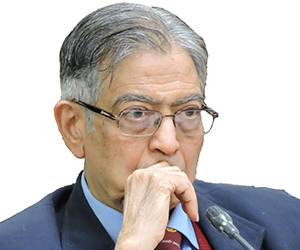


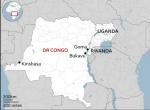
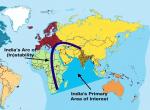

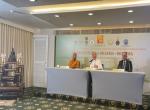
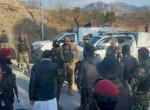

Post new comment